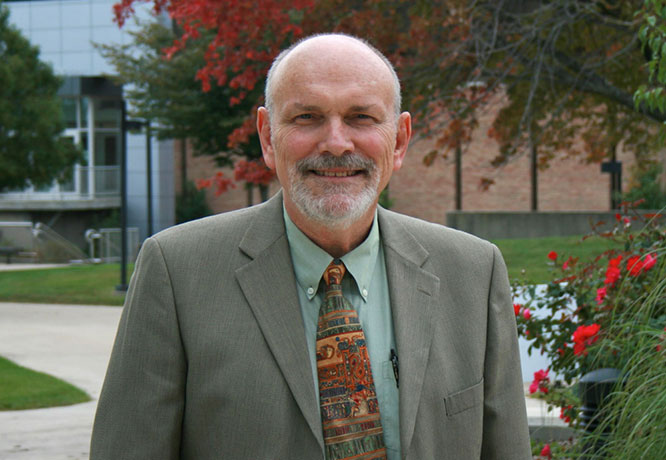By Katie Land, news editor
Composed of a diverse array of faculty, staff and administrators, the Oakland University community is unique, creative, and dedicated. As part of a continuing effort to explore the various roles and lives of our Golden Grizzlies, the News @ OU website presents a new interview series. We invite you to share these stories and “Take 5” with OU.
“Take 5 with Chris Clason”
Chris Clason, Ph.D., is the director of the Master of Arts in Liberal Studies program. Originally from California, Chris has been at Oakland since 1990 in the Department of Modern Languages and Literatures. He traditionally teaches a variety of courses in German language, culture and literature, especially German Romanticism. Chris has published numerous scholarly articles, and takes a special research interest in medieval literature. He recently took over the reins of the MALS program, which he hopes to develop into a hub of interdisciplinary work and discussion with other universities and programs. Chris lives in Rochester with his wife Stacey Hahn, an associate professor of French at OU.
1) Why do you think interdisciplinary research and learning is important?
Traditional academic disciplines are the rock on which we are founded. The world goes by at the speed of light, and it is so fast, so complex it is almost mad. When we are presented with such a fast and complex world, having foundations in these disciplines is essential in order to have a base to build upon. MALS serves many great functions, and helps people to think in new ways. When confronted with a problem, you can begin with those firm foundations and then get out and around it, and look at it from a new perspective. By exploring different fields and ideas, you begin to look at things in a new and unique way. MALS ensures the same rigorous coursework that other disciplines ensure, and urges students strongly to challenge themselves. I want to see students take courses outside their area of comfort. Oakland’s MALS program is so well designed. Natalie Cole and Linda Benson put everything together in such an incredible way. There are such great people in MALS. Our administrative assistant Graciela Osterberg does a fine job and knows everything, and our student assistant Valerie Edge does a great job, too. The program is well organized and the groundwork has been well laid. Natalie and Linda created the structure for the program to function in a rigorous and serious way. There are many interesting departments on campus, but MALS is a dream.
2) What drew you to study German language and literature?
Truthfully, when I was an undergrad at UCLA I was majoring in chemistry. I’ve always been a big reader, and loved early 19th century authors in particular. At the time, I was suffering from a broken heart and so indulged myself and let my studies slip a bit. I was doing well in German and so I began to explore that. I found I really enjoyed it. My grandmother was Austrian, but I don’t think that had much to do with my interest in German. Really, everything interests me. I can’t help it, I always want to learn more. I took a Native American literature course and uncovered some terribly beautiful and lyrical novels, and then I knew for certain that I wanted to do lit. Writing is a form of expression like nothing else. Reflecting through language while writing uses every facet of personality and experience. Reflection in language is used as a vehicle for expression. Whether you are writing essays, poetry or novels, the act of writing incorporates every brain cell.
3) What are your top three stranded-on-a-desert-island books?
1) “The Life and Opinions of the Tomcat Murr,” by E.T.A. Hoffmann
2) “Catch-22,” by Joseph Heller
3) “Madame Bovary,” by Gustave Flaubert
4) Where have you been on your recent travels?
Stacey and I love to travel. We went to Tulum, Mexico over spring break last year. Mostly to relax and I love to snorkel. This summer, we were in Germany in June. There is a study abroad site in Germany so I went to inspect it, and then took time to travel. We went to Bamberg, which is my favorite city. It is just so beautiful. Actually, E.T.A. Hoffmann, author of the Tomcat book, lived there for some time. And we also traveled to Husum – a tiny little city near the north sea coast. It is the home of another author, Theodor Storm. So some of these trips were a bit like a pilgrimage. We also traveled to Oregon in August, to Portland and along the California coast. We will probably retire someplace out there, since I’m still a West Coast boy. Portland has a great wine industry and food scene, and is just a tremendously historical place. We drove along and explored many small areas with their own crafts and traditions. It is wonderful to experience. And of course, we love all the raw, woodsy areas.
5) How do you like to spend your free time?
I play guitar and sing in a band with several other OU faculty members. We really are an interdisciplinary group, with Charlie Lindeman from biology, Stephen Filler from Japanese, Ron Rapin from Spanish, Brian Murphy, former director of The Honors College on drums, and KaC Cheok from engineering. We call ourselves “The Mongrel Dogs Who Teach,” after a lyric from a Bob Dylan song. I love playing and we have a great time. I think we all know our limitations as musicians, but we have great fun and play a little bit of everything. It’s really a very interesting group. We have very interesting faculty involved in the band, very talented people. Everyone has these wonderful things they do, and I’m always so impressed.

